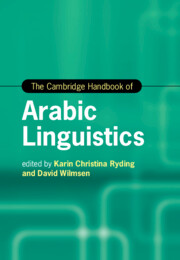Book contents
- The Cambridge Handbook of Arabic Linguistics
- Cambridge Handbooks in Language and Linguistics
- The Cambridge Handbook of Arabic Linguistics
- Copyright page
- Contents
- Figures
- Tables
- Notes on Contributors
- Acknowledgements
- Abbreviations
- Introduction
- Part I Arabic Applied Linguistics
- Part II Arabic Variation and Sociolinguistics
- 7 Diglossia, Variation, and Structural Complexity
- 8 Sociolinguistic Variation and Variation in Sociolinguistics
- 9 What Is Formal Spoken Arabic?
- 10 Arabic Dialectology
- 11 Maltese
- Part III Theoretical and Descriptive Studies
- Part IV Arabic Computational and Corpus Linguistics
- Part V Arabic Linguistics and New Media Studies
- Part VI Arabic Linguistics in Literature and Translation
- Index
- References
10 - Arabic Dialectology
from Part II - Arabic Variation and Sociolinguistics
Published online by Cambridge University Press: 23 September 2021
- The Cambridge Handbook of Arabic Linguistics
- Cambridge Handbooks in Language and Linguistics
- The Cambridge Handbook of Arabic Linguistics
- Copyright page
- Contents
- Figures
- Tables
- Notes on Contributors
- Acknowledgements
- Abbreviations
- Introduction
- Part I Arabic Applied Linguistics
- Part II Arabic Variation and Sociolinguistics
- 7 Diglossia, Variation, and Structural Complexity
- 8 Sociolinguistic Variation and Variation in Sociolinguistics
- 9 What Is Formal Spoken Arabic?
- 10 Arabic Dialectology
- 11 Maltese
- Part III Theoretical and Descriptive Studies
- Part IV Arabic Computational and Corpus Linguistics
- Part V Arabic Linguistics and New Media Studies
- Part VI Arabic Linguistics in Literature and Translation
- Index
- References
Summary
Stephan Procházka gives an overarching view of Arabic dialectology from its beginnings in the nineteenth century to the present day, also providing an overview of the general characteristics of spoken varieties of Arabic wherever those are found. Arabic dialectology examines regional variation using both synchronic (dialect geography) and diachronic (language change) approaches. Although its findings are relevant for the study of universal language tendencies in general, and of comparative Semitics in particular, Arabic dialectology has been widely ignored by theory-driven general linguistics. This may be because Arabic dialectologists have largely been interested in description of the myriad phenomena of the multitudinous spoken varieties of Arabic without concerning themselves much with theory. Lately, however, scholars working in Arabic dialectology have begun to present their work in such a way as to be more accessible to the broader field of linguistics.
Keywords
- Type
- Chapter
- Information
- The Cambridge Handbook of Arabic Linguistics , pp. 214 - 243Publisher: Cambridge University PressPrint publication year: 2021
References
- 1
- Cited by

